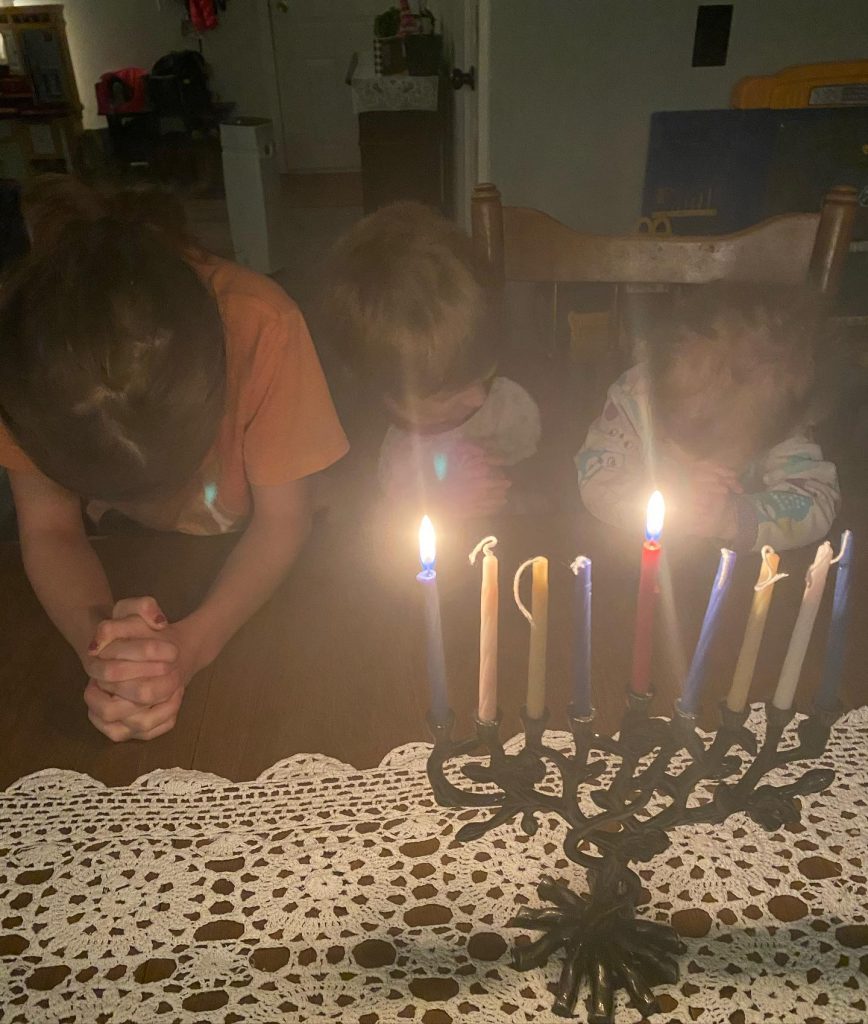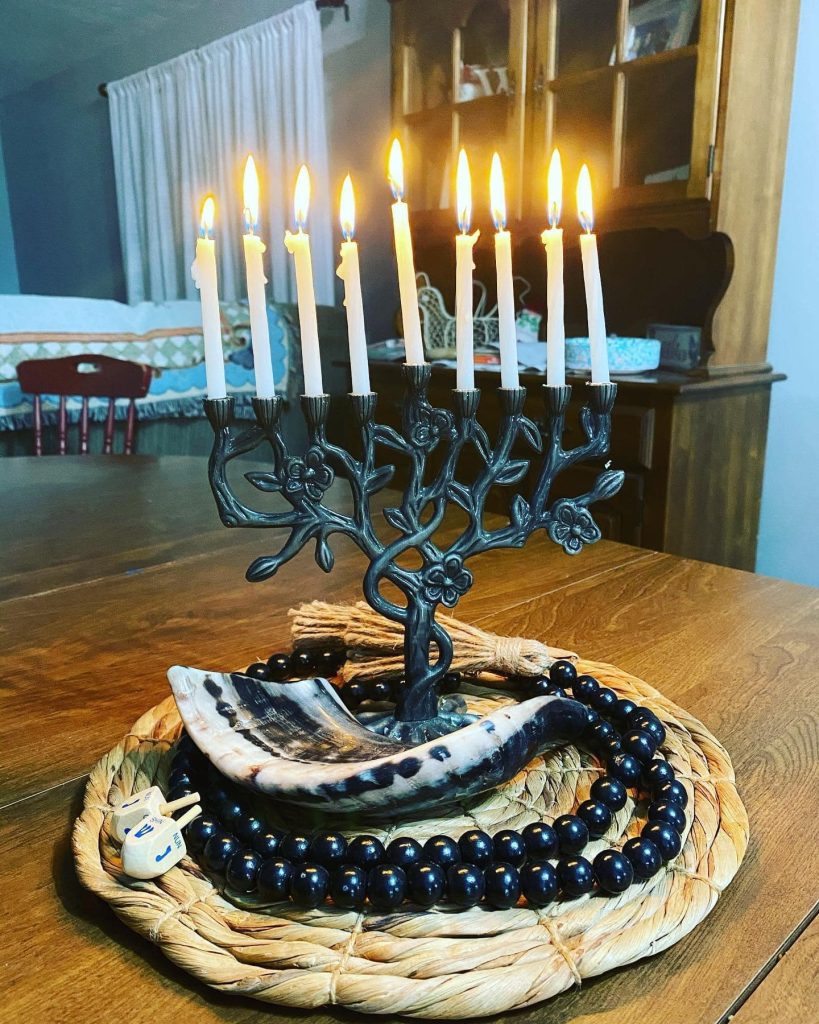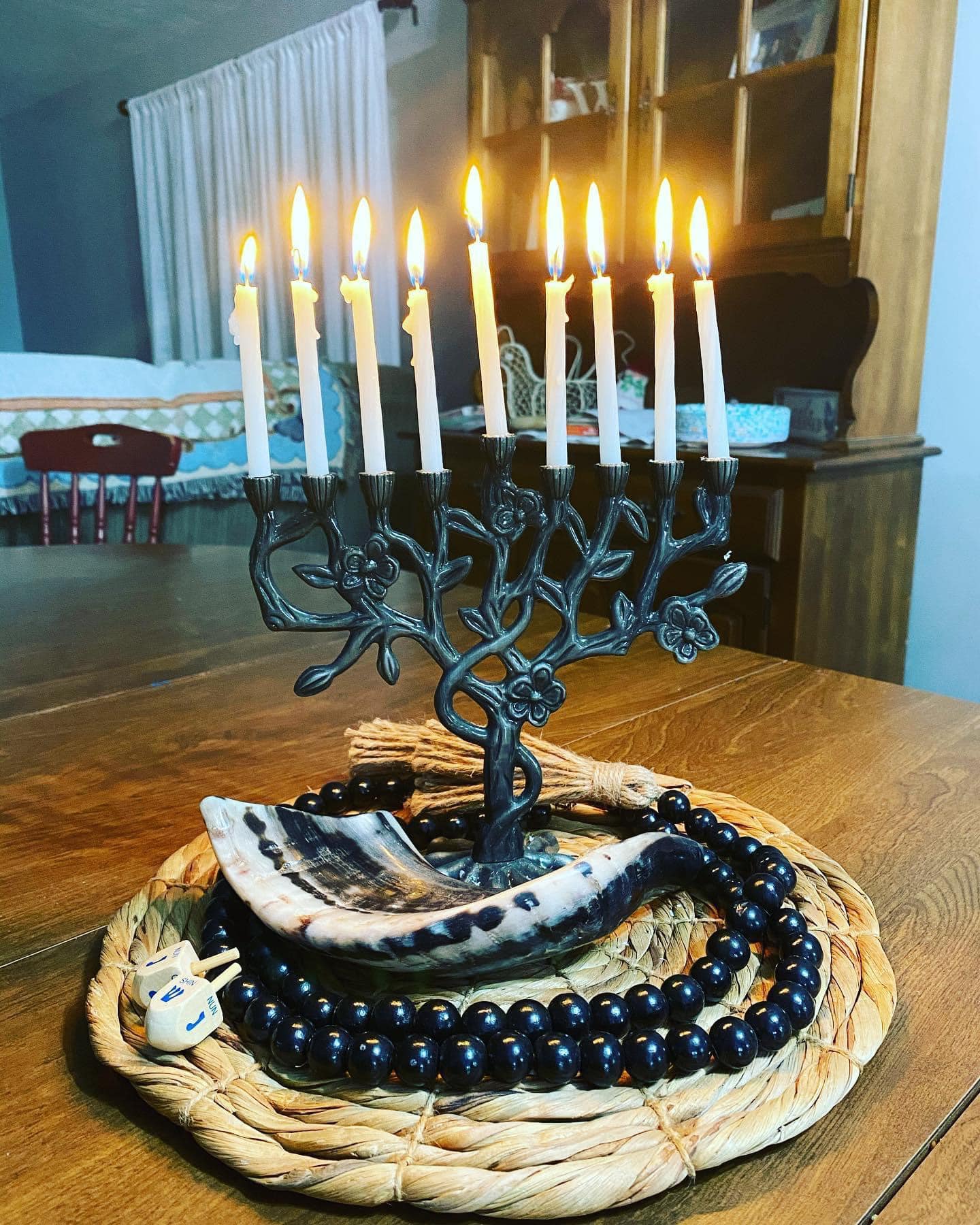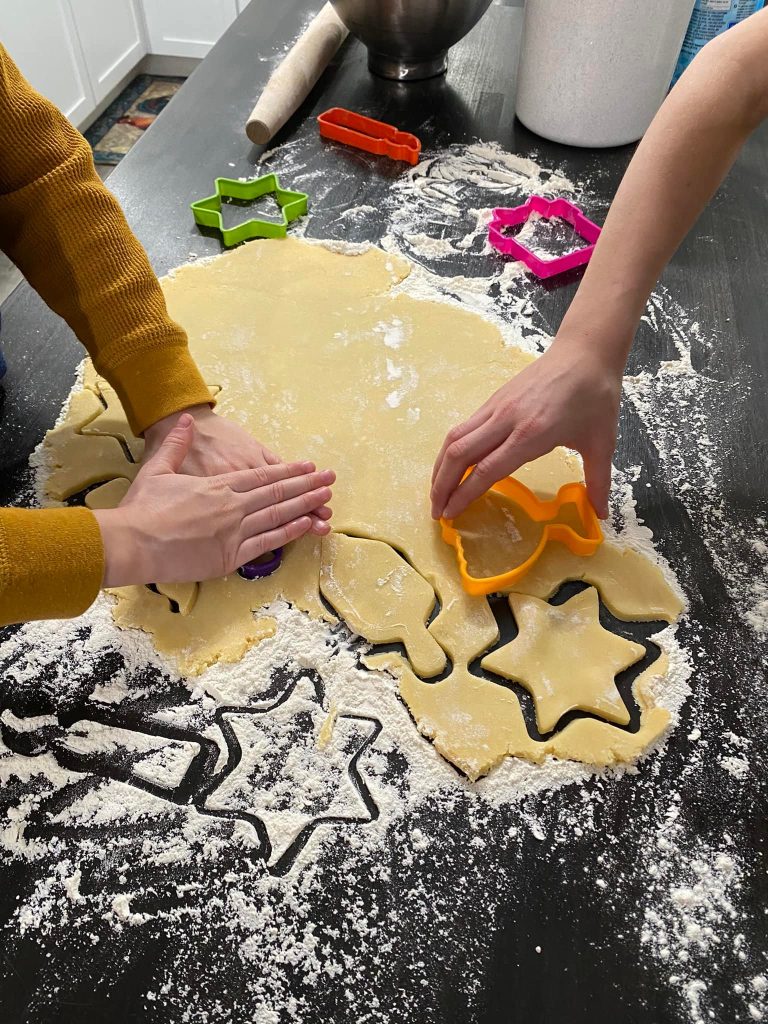**This blog post does contain affiliate links. When you click on them and make a purchase through their site via the link or extra code our family is given a small bonus at no extra cost to you. **
Celebrating Hanukkah as a Christian: Embracing Tradition and Understanding Its Significance
As the holiday season approaches, many people around the world prepare to celebrate a variety of traditions and festivals, from Christmas to New Year’s. While Christmas is the central holiday for most Christians, some may find themselves drawn to celebrate Hanukkah, the Jewish Festival of Lights, as well. This interest can stem from a desire to connect with Jewish heritage, learn about the roots of Christianity, or simply enjoy the festive atmosphere and values that Hanukkah promotes. But what does it mean for a Christian to celebrate Hanukkah? How can Christians engage with this Jewish holiday in a meaningful way?
The History of Hanukkah
Hanukkah (or Chanukah) is a Jewish holiday that commemorates the rededication of the Second Temple in Jerusalem during the 2nd century BCE. According to Jewish tradition, after the Maccabees led a revolt against the Seleucid Empire, they reclaimed the desecrated Temple. When they sought to light the menorah, a sacred seven-branched lamp, there was only enough oil to last one day. Miraculously, the oil burned for eight days, which is why Hanukkah is celebrated for eight nights.
While Hanukkah is not one of the most significant Jewish religious holidays like Yom Kippur or Passover, it has gained prominence, particularly in the diaspora, as a way to celebrate Jewish identity, resilience, and the miracle of light.
Christian Connection to Hanukkah
While Hanukkah is distinctly Jewish in its origins and practices, it holds significance for Christians as well, especially in light of the shared roots of Christianity and Judaism. Yeshua/Jesus, the central figure of Christianity, was born and lived as a Jewish man. The Gospels recount how he celebrated Jewish holidays, including Hanukkah (referred to as the Feast of Dedication in John 10:22). This provides a direct connection for Christians to the holiday.
The themes of Hanukkah—light overcoming darkness, miracles, and the triumph of faith—are not only central to Jewish tradition but also resonate deeply within Christian beliefs. Christians who observe Christmas, the celebration of the birth of Yeshua/Jesus, are already familiar with the idea of light overcoming darkness. Yeshua/Jesus is often referred to as the “Light of the World” in Christian theology, making Hanukkah a meaningful occasion to reflect on the light that shines in the darkness of the world.
Why Some Christians Celebrate Hanukkah
There are several reasons why some Christians may choose to celebrate Hanukkah, either fully or in part:
Understanding Jewish Roots of Christianity: Christianity originated within the Jewish tradition, and understanding Jewish holidays like Hanukkah can provide Christians with a deeper connection to the historical and cultural context of their faith. Hanukkah, like Passover and other Jewish holidays, helps Christians appreciate the shared heritage and stories that are foundational to Christianity.
Reflecting on the Theme of Light: The symbolism of light is central to both Hanukkah and Christmas. Hanukkah celebrates the miracle of light in the Temple, while Christmas (for some Christians) celebrates the arrival of Yeshua/Jesus as the Light of the World. For Christians, observing Hanukkah can be a way to reflect on the enduring power of light in a world often filled with darkness and despair.
Building Bridges Between Communities: Interfaith dialogue and understanding have become increasingly important in today’s world. By participating in Hanukkah celebrations, Christians can show solidarity and respect for Jewish traditions, fostering greater understanding between the two communities.
Enjoying the Festive Traditions: Hanukkah is a joyous time filled with food, games, and family gatherings. Christians who appreciate these aspects of holiday celebrations may enjoy participating in the lighting of the menorah, spinning the dreidel, and eating traditional foods like latkes (potato pancakes) and sufganiyot (jelly doughnuts).
How Christians Can Celebrate Hanukkah
If a Christian wishes to celebrate Hanukkah, there are several ways they can do so meaningfully, while respecting the traditions of the Jewish faith. Here are a few ideas:
Lighting the Menorah: The central tradition of Hanukkah is lighting the menorah, a candelabrum with nine branches (eight for each night of Hanukkah and one for the shamash, the candle used to light the others). Christians can light a menorah each evening to remember the miracle of light and reflect on the light of Christ in their own lives.
Reflecting on the Meaning of Light: Christians can use Hanukkah as an opportunity for prayer and reflection on the theme of light. They can think about how the light of Yeshua/Jesus shines in the world and how they can share that light with others through acts of kindness, love, and service.
Sharing a Meal: Hanukkah is a time for family and community, often marked by festive meals. Christians can join in the tradition by preparing or sharing foods like latkes and sufganiyot, or even cooking together as a way to build community.
Studying the Story of Hanukkah: Christians can deepen their understanding of the holiday by learning more about the history of Hanukkah, the Maccabean revolt, and its significance in Jewish faith. Understanding the context in which Yeshua/Jesus celebrated this holiday can also enrich one’s understanding of his life and ministry.
Fostering Interfaith Relationships: Christians who are friends or family members with Jewish people may use Hanukkah as an opportunity to learn more about Jewish culture, share in the celebrations, and foster meaningful interfaith connections.
The Importance of Respect and Sensitivity
It’s crucial to approach the celebration of Hanukkah as a Christian with respect and sensitivity. Hanukkah is a deeply important religious holiday for Jewish people, and it should be celebrated in a way that honors its significance and avoids trivializing or appropriating Jewish traditions. Christians who participate in Hanukkah should seek to understand its roots and practices and avoid turning it into a mere cultural or aesthetic experience.
By participating in Hanukkah, Christians can enrich their faith journey, deepen their understanding of Yeshua/Jesus’ Jewish heritage, and express solidarity with the Jewish community. It’s a reminder of the enduring power of light, hope, and miracles—values that transcend faith traditions and unite people of goodwill across the world.
Our Family’s Hanukkah Traditions
This year will be our family’s fourth year celebrating Hanukkah. Our family celebrates it as a memorial and a reminder of history and God’s unfailing faithfulness.
We don’t add in all the Jewish traditions, which are beautiful but not where our hearts are on the topic. We as a family keep our celebrations simple. We have prayer followed by a moment of silence as we light the proper candles each evening. We borrow different children’s books from the library on Hanukkah. We read one together each evening.
Our favorite tradition though is making Hanukkah themed sugar cookies. We always set the mood with a worship music playlist. We dance and sing while we bake and decorate together. Our family doesn’t choose to participate in the Christmas holiday, so when we visit with family during the holiday season we blessed them with our cookies. We simply choose to be like the menorah, spreading the light and love of Yeshua/Jesus to others.


Hanukkah Sugar Cookies
Ingredients
- 2 3/4 cups all-purpose flour
- 1 tsp baking soda
- 1/2 tsp baking powder
- 1 cup unsalted butter, softened 2 sticks
- 1 1/2 cups granulated sugar
- 1 egg large
- 1 tsp vanilla extract
- 1/4 tsp salt
Icing Glaze
- 1 cup powdered sugar (confectioners’ sugar)
- 2-3 tbsp milk or water adjust for desired consistency
- 1 tsp vanilla
- salt pinch
- food coloring dye-free is best
Instructions
- Preheat your oven: 350°F (175°C) and line baking sheets with parchment paper or silicone baking mats.
- Mix dry ingredients: In a medium-sized bowl, whisk together the flour, baking soda, baking powder, and salt. Set aside.
- Cream the butter and sugar: In a large bowl, beat the softened butter and granulated sugar together using an electric mixer on medium speed until light and fluffy (about 2-3 minutes).
- Add egg and extracts: Add the egg, vanilla extract, and almond extract (if using). Continue to beat until the mixture is smooth.
- Combine wet and dry ingredients: Gradually add the dry flour mixture to the butter mixture, mixing just until combined. Be careful not to overmix the dough.
- Chill the dough: Cover the dough with plastic wrap and chill it in the refrigerator for at least 1 hour. Chilling helps the cookies keep their shape while baking.
- Roll out the dough: On a lightly floured surface, roll out the dough to about 1/4 inch thickness. Use cookie cutters to cut out shapes or simply slice into rounds with a glass.
- Bake the cookies: Place the cut-out dough onto the prepared baking sheets, spacing them about 2 inches apart. Bake for 8-10 minutes or until the edges are lightly golden. Keep an eye on them to avoid overbaking.
- Cool the cookies: Remove the cookies from the oven and let them cool on the baking sheet for 5 minutes. Then, transfer them to a wire rack to cool completely before glazing.
Making the Icing Glaze:
- Prepare the glaze: In a medium bowl, whisk together the powdered sugar, vanilla extract, and a pinch of salt. Gradually add the milk, one tablespoon at a time, until you reach your desired consistency. The glaze should be thick enough to hold its shape but thin enough to spread easily.
- Color the icing (optional): If you want colored icing, divide the glaze into separate bowls and add a few drops of food coloring to each one. Stir until the color is evenly mixed.
- Glaze the cookies: Once the cookies are fully cooled, use a spoon or a small offset spatula to spread the glaze over the tops of each cookie. Alternatively, you can dip the tops of the cookies into the glaze for a more even coating.
- Decorate (optional): For an extra festive touch, you can add sprinkles or edible glitter to the wet glaze. Let the cookies sit at room temperature for 30 minutes to allow the glaze to set.
Tips for Success:
Chill the dough: Chilling the dough before rolling it out is key to making the cookies easy to cut and ensuring they keep their shape while baking.
Glaze consistency: If your glaze is too thick, add more milk a teaspoon at a time. If it’s too thin, add a little more powdered sugar.
Storage: Once the glaze has set, you can store the cookies in an airtight container at room temperature for up to 5 days. For longer storage, freeze the cookies before icing and glaze them after thawing.
Other Hanukkah Teachings

“Yeshua spoke to them again: “I am the light of the world; whoever follows me will never walk in darkness but will have the light which gives life.”
– John 8:12




Leave a Reply